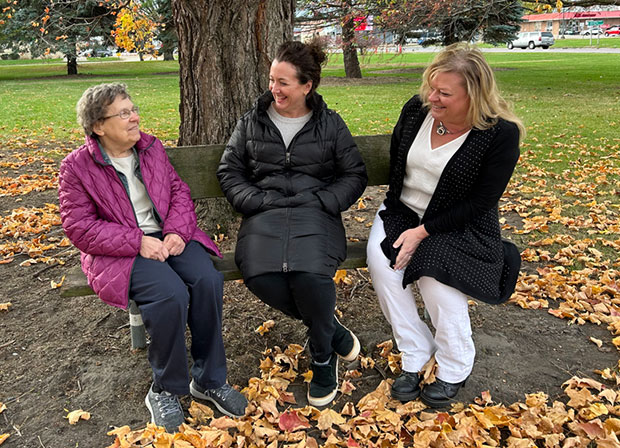
Sister Jan Cebula, OSF, Shannon Sander-Welzien and Regan Michaelsen sit at the future site of a supportive housing project in Clinton in this November 2023 photo.
By Barb Arland-Fye
The Catholic Messenger
When a $5.5 million permanent supportive housing project in downtown Clinton was in jeopardy last fall because of not-in-my-backyard opposition, the Sisters of St. Francis intensified their advocacy efforts to prevent the project’s demise. Their efforts, coupled with that of other supporters and attorneys, saved the project, which the Clinton City Council approved Nov. 14.
The Clinton Franciscans are among the most ardent supporters of the YWCA’s project that will provide stability for individuals struggling with chronic homelessness. A report shows that 1,241 households experienced homelessness between 2019 and 2021 in Clinton County, which has the highest level of homelessness (just under 3% in 2021) compared to its total population among the neighboring counties of Cedar, Jackson, Dubuque and Scott counties.
At stake was a $4.4 million grant from the National Housing Trust Fund (NHTF), the largest such award in Iowa, to go toward building 24 units of supportive housing apartment units and office space. The YWCA required City Council approval to purchase city-owned property in DeWitt Park by Nov. 30. The Iowa Finance Authority, which administers the grant, had extended the deadline after the City Council rejected the YWCA’s first proposed site for the project because of community opposition.
During a standing-room-only meeting the night of the City Council vote, Sister Jan Cebula, president of the Sisters of St. Francis, spoke on behalf of the project and the need for supportive, affordable housing. She shared how the Clinton Franciscans began gathering a group of agencies about nine years ago to address the needs of Clinton residents who are unhoused.
Sister Cebula cited the Clinton, Iowa Housing Needs Analysis & Housing Strategies Report, 2023, which identified three main housing challenges in Clinton: shortage, affordability and quality. The housing needs analysis states, “Clinton needs 635 additional units to provide affordable housing to renter households making less than $20,000 annually. There is a need,” she said. “The YWCA supportive housing project would help address all three of these challenges,” she said at the City Council meeting.
She pointed out that the future tenants of the supportive housing project are residents of Clinton. “Perhaps they currently reside in your ward and are just a paycheck and an emergency away from becoming unhoused.”
Other members of the Clinton Franciscans are active advocates for affordable housing as well, including Sister Kathleen Holland, OSF. She serves on the YWCA’s Board of Directors and gives talks about the YWCA Clinton Empowerment Center, which assists families with children and individuals in Clinton and Jackson counties experiencing or on the verge of experiencing homelessness.
While volunteering at the YWCA, “I had opportunities to interact with people experiencing homelessness,” Sister Holland said. After one of her talks about the Empowerment Center, “a woman came up to me, shaking her finger saying, ‘what do you mean there are homeless people in Clinton? I have lived here all my life and NEVER seen a homeless person!’”
“People without homes don’t walk around with placards or have an “H” painted on their foreheads,” Sister Holland responded. “That moment lit a ‘fire in my belly’ and began my journey to work for the people who are experiencing homelessness in Clinton and Jackson counties!”











